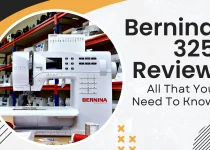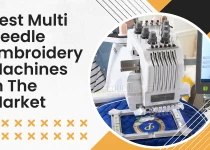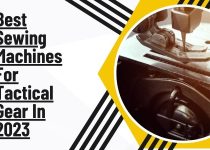Best Coverstitch Machine in 2023: Our Top 3 Picks
Quality finishing puts a lot of value in any stitch work. Any ordinary machine may do the job but the outcome is not guaranteed to be beautiful. A cover stitch machine is a much better choice to perform the task with.
So, what are the best cover stitch machines to own?
- Juki MCS 1500 is the overall best option in our opinion. It’s super fast and long-lasting.
- Brother 2340CV is best in sturdiness and warranty. It gives a neat professional finish.
- Janome 1000 is the best in terms of simplicity. From beginner to professional it’s suitable for all users.
That’s the highlighting points in our today’s discussion. Read more to find the main features, pros, cons, and more details about them.
Let’s begin!
Best Coverstitch Machines To Buy
We’ll cover three of the best cover stitch machine in our today’s discussion. Here’s a little glimpse of their functionalities.
Let’s dive deep into the details.
Brother 2340CV: The Reliability King With 25* Years of Warranty
Specs
- Stitch Speed: 1,100 SPM
- No.of Needles: 3
- Threads: 2/3/4
- Thread Tension System: Manual
- Pressure Foot: Adjustable
- Differential Feed: 0.7-2.0mm
- Stitch Width: 3 or 6mm
- Stitch length: 1-4mm
- Product Dimension:13″D x 15″W x 13.4″H
- Item Weight: 13 pounds
- Warranty: Limited 1-year parts & labor; 5-year electric. Limited 25 years in the US
Pros
- Internal parts and the metallic frame are sturdy
- Easy to use
- Guaranteed professional finish
- Can be used right out of the box thanks to the quick thread looper system.
- Includes hem sewing presser foot and regular foot accessories.
- Standard warranty of 25 years when operated at 120 volts only in the United States.
- The fabric seldom stretches bunches or while working.
- Threading is simple with color-coded guidelines.
Cons
- There is no automatic tension release.
- There is no free arm.
- Incompatible for 240-volt operation.
- Some specific fabrics and threads are incompatible.
- Customer service is limited outside of the US.
- There is no bobbin winder or built-in thread cutter, which may require the purchase of additional supplies.
- Little noisy when sewing.
The Brother 2340CV is an excellent cover stitch machine since it can perform a wide range of stitches. It has the ability to perform chain stitches, tri-cover stitches, flatlock, utility stitches, and a broad-narrow cover stitch.
The machine has a hefty style, but it’s lightweight. It has dimensions of 11.8″ x 11 x 13.4″. If speed is the priority then this Brother’s machine with 1000 SPM (stitches per minute) will fulfill your needs.
But to get the hems properly, the front and rear feed dogs must be managed. The slider level adjustment guide manages the feed dog for you.
One feature that beginners will be thankful for about this machine is the color-coded threading guide. It makes looping and needling pretty simple.
Another advantage is the distinctive presser foot, which snaps back into place after use. Now, let’s talk about some of the disadvantages.
However, according to the users, the harp space is too small. Get ready to roll up your fabric whenever you begin a new project. It also doesn’t have a free arm which causes discomfort to users.
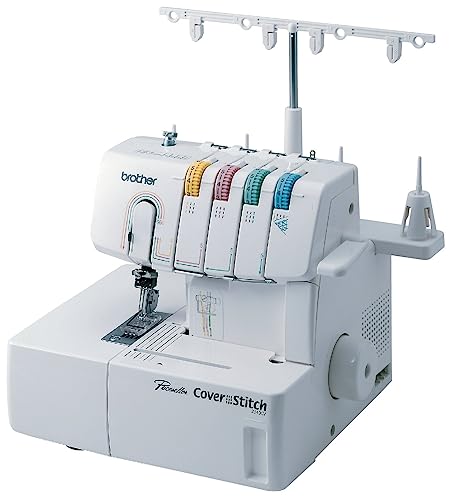
Despite the complaints, Brother 2340CV is one of the best inexpensive cover stitch machines. Also, it comes with 25 years of limited warranty in the US.
Juki MCS – 1500: Lightening Fast With 1350 SPM
Specs
- Stitch Speed: 1,350 SPM
- No.of Needles: 3
- Threads: 1/2/3
- Thread Tension System: Manual
- Pressure Foot: Adjustable to 10mm
- Differential Feed: No waving in knits N-2, No puckering 0.7-N
- Stitch Width: 2.5 or 5 mm
- Stitch length: 1-4mm
- Product Dimension: 14″D x 15.5″W x 13.5″H
- Item Weight: 19.81 pounds
- Warranty: 5 years mechanical; 2 years electrical; 90 days material & workmanship.
Pros
- This machine is built to last.
- It is threaded. All you have to do is lay the fabric down and sew.
- Can do heavier stitching on items such as pants.
- Every purchase includes 100 needles
- Stitches very fast.
- Can do stitch length adjustment.
- Has differential feed
- Loop threading is easy
- Doesn’t skip stitches
- Rarely jams
- Gives high-end results
- Compatible with any fabric
Cons
- Accessories are not included
- It takes time to master threading
- The machine is heavy so not portable
Juki has built a reputation for providing some of the most excellent stitching equipment on the market. The Juki MSC-1500 is one of the best addition to their portfolio.
This machine’s primary function is to sew cover stitches for armholes, necklines, sleeves, and basic hems. Making chain stitches with this machine is easy even for beginners.
The thread cutter cuts the unnecessary sections of thread while or after stitching. So, the chances of the upper thread getting stuck on the shuttle hook are slim.
It works really fast as the SPM rate 1,350. You can adjust the presser foot to modify the pressure to a setting appropriate for you. And the stitching speed can be controlled through the adjustable differential feed.
The pressure foot is located a bit high with a guide placed near it. So you can place the fabric with more ease. Like other stitch machines, Juki 1500 has a few drawbacks.
Although it is not an expensive machine it doesn’t have other necessary accessories. Such as a hem guide, spool caps, or additional needles. Buying accessories separately will raise the cost of your project.
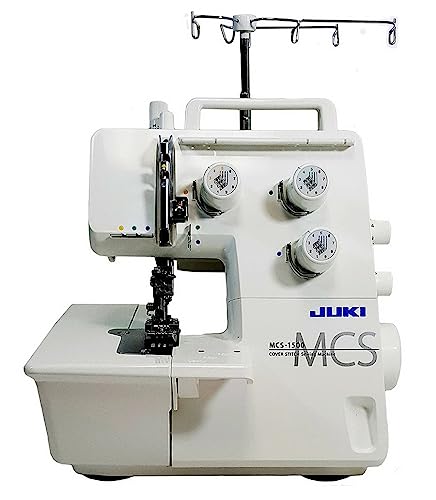
Also, threading Juki 1500 can be a little complex. You’d need to practice to master the threading technique. Overall, it’s a good machine to own for cover stitching.
Janome Cover Pro 1000 CPX: Beginners To Expert Friendly
- Bonus Includes: – Two packs of Schmetz ELx705 needles – Adjustable Seam Guide – Needle Threader
Specs
- Stitch Speed: 1,000 SPM
- No.of Needles: 3
- Threads: 2/3/4
- Thread Tension System: Automatic
- Pressure Foot: Adjustable
- Differential Feed: 0.5 – 2.25 mm
- Stitch Width: 3 or 6mm
- Stitch length: 1-4mm
- Product Dimension: 16.5″D x 19.5″W x 14.5″H
- Item Weight: 15 pounds
- Warranty: 5-year mechanical; 2-year electric; 90 days materials & workmanship
Pros
- Threading is easy
- Broad harp space
- Has a long free arm
- Has a foot controller to control the stitch speed
- Can manufacture single chain stitch, double and triple needle cover stitch
- Has an adjustable presser foot that easily allows sewing through thick layers of cloth.
- Compatible with all types of fabrics
- Has an adjustable differential feed
- Accessories include two packs of Schmetz ELx705 needles, an Adjustable Seam Guide, and a Needle Threader.
Cons
- Compatible with high-quality threads only
- The strong metal presser foot makes visibility difficult
- Not suitable for heavy fabrics like leather or denim
- Oiling is required on a regular basis to guarantee smooth stitching.
- Lacks an automatic thread cutter, so trimming threads can be difficult
- Skips stitches on fabrics like cotton
- Expensive
Janome 1000 CPX is an improved version of its predecessor Janome 900CPX. Unlike the needle issues of Janome 9450, it performs pretty excellently.
It surpasses the Brother 2340 CV in terms of ease thanks to its lengthy free arm. The free arm allows the machine to sew while hemming. It also has a spacious harp space that makes working on it quite easy.
Works like chain stitch or cover stitch get a neat and tidy professional finish. Another advantageous feature is the color-coded path technique. It makes the stitching easier for even beginners.
The Janome 1000 CPX can provide a decent stitching speed with 1000 SPM. But not as fast as Brother 2340 CV or Juki MCS 1500.
Although it has strong features like a free arm and a spacious harp, it has some limitations. Janome 1000 CPX can work with high-quality threads only and they cost a lot.
It also can’t work on heavy fabrics such as denim or leather. In fact, there are complaints about stitch skipping on fabrics like cotton which are slightly heavier.
It is of high maintenance as you have to oil the parts on a regular basis. 3 in 1 oil is suitable for sewing machines like this.
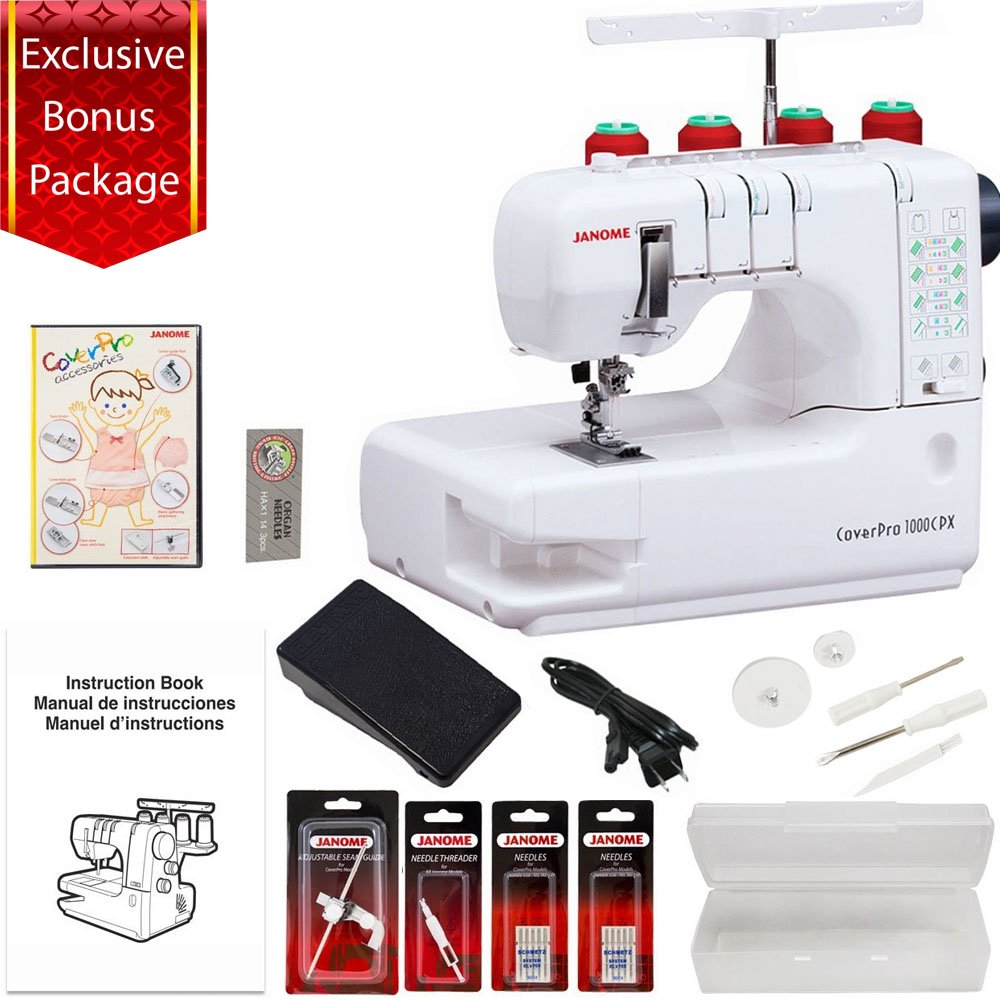
Nevertheless, the end outcome it provides is quite satisfactory, making it one of the most bought cover stitch machines.
Cover Stitch Sewing Machine Buying Guideline
A couple of things you should consider before buying a cover stitch machine.
Accessories
Accessories can make a lot of difference in your work. Everything from thread spool nets to Schmetz needles, accessory screws, tweezers, and needle threaders all are necessary.
Repair and cleaning essentials are also provided with cover stitch machines. They all are essential parts to keep everything running perfectly.
It’s important to make sure you’re getting all the necessary additional accessories in the cover stitch machine you’re buying. If the accessories need to be bought separately then the cost will grow.
Fabric Type
Some cover stitch machines are more friendly to particular textiles than others. This is determined by the machine’s needles and threading.
So, choose the cover stitch machine based on the majority of the fabric type of your projects. The weight and texture of the fabric make a lot of difference.
For example, georgettes with thick layers of knit will need a machine with an adjustable differential feed. And the machine needs to be of higher settings.
For regular fabrics cotton or polyester high settings are not so necessary.
Brand
Trusting the brand value is a must. Well-established brands like Brother, Juki, Janome, etc have proven them in the market and continue to improve them more.
Good brands offer well-deserved customer service. Even if they cost a little, they have more perks to them. So, go for sewing machines from well-known brands.
Speed
Speed is an important factor if time management is important for your project. When working on multiple sewing projects the stitch speed is crucial.
If you are experienced and work on simple projects then go for speedy options.
Frequently Asked Questions (FAQs):
What threads can be used on cover stitch machines?
Polyester, woolly nylon, cotton, rayon, and metallic threads go well with cover stitch machines. The type of thread that’ll work well on the cover stitch machine generally depends on the fabric type. Also, on the type of the cover stitch machine.
What are the basic applications of a cover stitch machine?
Cover stitch machines are used for hemming, seam finishing, decorative stitching, and elastic applications. All these applications have various types of sewing methods. Depending on the needle count their application may vary from model to model.
How do cover stitch and serger machines differ?
Cover stitch machines are used for finishing knit fabrics and hemming. Whereas serger machines are used for trimming and finishing the opened edges of knit or woven fabrics. Cover stitch machines can make double or triple stitches on the fabric. Serger makes a covered stitch on the material’s edge.
Conclusion
That’s all for today’s discussion on the best cover stitch machines. So, which one was your pick among them? Whichever you choose it won’t be a loss regardless of the price.
However, it’s best you consider all their functionalities to see if they match your expectation from the machine beforehand. After all, sewing is kind of expensive.
See you soon!



